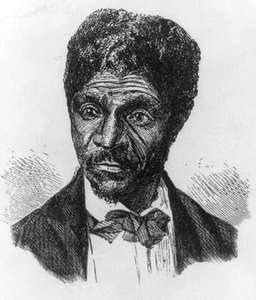From Black History.com:
 On March 6, 1857, the U.S. Supreme Court handed down its decision in Scott v. Sanford, delivering a resounding victory to southern supporters of slavery and arousing the ire of northern abolitionists. During the 1830s, the owner of a slave named Dred Scott had taken him from the slave state of Missouri to the Wisconsin territory and Illinois, where slavery was outlawed, according to the terms of the Missouri Compromise of 1820. Upon his return to Missouri, Scott sued for his freedom on the basis that his temporary removal to free soil had made him legally free. The case went to the Supreme Court, where Chief Justice Roger B. Taney and the majority eventually ruled that Scott was a slave and not a citizen, and thus had no legal rights to sue.
On March 6, 1857, the U.S. Supreme Court handed down its decision in Scott v. Sanford, delivering a resounding victory to southern supporters of slavery and arousing the ire of northern abolitionists. During the 1830s, the owner of a slave named Dred Scott had taken him from the slave state of Missouri to the Wisconsin territory and Illinois, where slavery was outlawed, according to the terms of the Missouri Compromise of 1820. Upon his return to Missouri, Scott sued for his freedom on the basis that his temporary removal to free soil had made him legally free. The case went to the Supreme Court, where Chief Justice Roger B. Taney and the majority eventually ruled that Scott was a slave and not a citizen, and thus had no legal rights to sue.
According to the Court, Congress had no constitutional power to deprive persons of their property rights when dealing with slaves in the territories. The verdict effectively declared the Missouri Compromise unconstitutional, ruling that all territories were open to slavery and could exclude it only when they became states. While much of the South rejoiced, seeing the verdict as a clear victory for the slave system, antislavery northerners were furious. One of the most prominent abolitionists, Frederick Douglass, was cautiously optimistic, however, wisely predicting that —This very attempt to blot out forever the hopes of an enslaved people may be one necessary link in the chain of events preparatory to the complete overthrow of the whole slave system.”
More here. (Note: Throughout February, we will publish at least one post dedicated to Black History Month)
